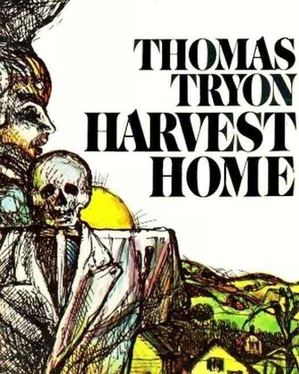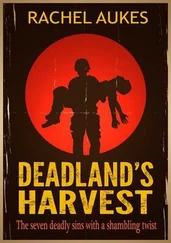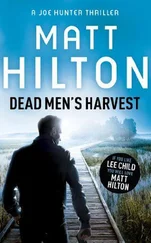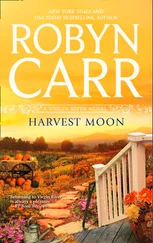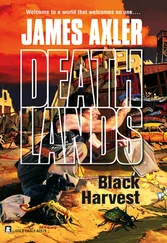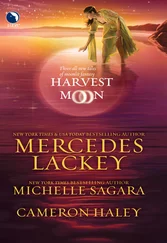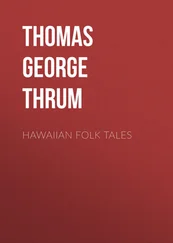Thomas Tryon - Harvest Home
Здесь есть возможность читать онлайн «Thomas Tryon - Harvest Home» весь текст электронной книги совершенно бесплатно (целиком полную версию без сокращений). В некоторых случаях можно слушать аудио, скачать через торрент в формате fb2 и присутствует краткое содержание. Жанр: Ужасы и Мистика, на английском языке. Описание произведения, (предисловие) а так же отзывы посетителей доступны на портале библиотеки ЛибКат.
- Название:Harvest Home
- Автор:
- Жанр:
- Год:неизвестен
- ISBN:нет данных
- Рейтинг книги:5 / 5. Голосов: 1
-
Избранное:Добавить в избранное
- Отзывы:
-
Ваша оценка:
- 100
- 1
- 2
- 3
- 4
- 5
Harvest Home: краткое содержание, описание и аннотация
Предлагаем к чтению аннотацию, описание, краткое содержание или предисловие (зависит от того, что написал сам автор книги «Harvest Home»). Если вы не нашли необходимую информацию о книге — напишите в комментариях, мы постараемся отыскать её.
For Ned and his family, Cornwall Coombe was to be come a place of ultimate horror.
Harvest Home — читать онлайн бесплатно полную книгу (весь текст) целиком
Ниже представлен текст книги, разбитый по страницам. Система сохранения места последней прочитанной страницы, позволяет с удобством читать онлайн бесплатно книгу «Harvest Home», без необходимости каждый раз заново искать на чём Вы остановились. Поставьте закладку, и сможете в любой момент перейти на страницу, на которой закончили чтение.
Интервал:
Закладка:
“Here you are, Robert-no need to hide that jug, Fred, I haven’t lived here twenty-three years not to know you can’t have a husking bee without a spot of the old stuff. Robert, come along, I want to be sure you remember your way to the stage for the narration,” and she went away propelling Robert behind the curtains.
The men passed the jug, tilting it to their mouths on the crook of their elbows and handing it to me to follow suit; I felt the mellow liquor slide down my throat, and accepted the tumbler of water Will Jones offered as a chaser.
A drum rattled, and baskets were brought in and distributed while the men rolled up their sleeves for work, the women fluffed out their aprons, and all began donning corn mitts. When the hands of the clock between the windows pointed to eight, the husking bee commenced, and all of us rushed to attack the giant heap of corn, forming a circle on the floor, stripping off the husks, and shelling the cobs.
In that token ceremonial, it seemed that the village had summoned up all its reserves of bonhomie and good spirits for this merriest of nights; the Grange walls resounded with the good-natured joshing of the farmers, the echoing chatter of the womenfolk, the unquenchable spirits of the children. There was a joyousness in the labor, a high-jinks, devil-may-care attitude as though, the summer’s labors done, now they could relax and share a comradeship that stemmed from the symbolic harvest that towered before them, a mountain of security for the coming year. Farmers I scarcely knew came and slapped me on the back and joked with me; their wives, whom I had seen only in church, stopped to exchange pleasantries and say how glad they were our family had come to Cornwall Coombe. Custom and reserve seemed abandoned, all was jollity itself, so jolly that one pull at the stone bottle surely called for another, and when one jug was empty there was another to take its place.
The time passed and we worked unstintingly; the dust from the husks rose in the air, the kernels falling in golden showers into certain of the baskets, the cobs thriftily reserved in others. When the baskets were filled, they were borne away, to be returned empty, ready to be filled again. Meantime the orchestra kept up any nagging spirits with one old tune after another.
I wiped the sweat from my brow, tilted the jug as it was passed again, and went back to work with renewed vigor. If there was laughter, it seemed I could laugh louder; if there was shouting, I could shout louder; singing, sing louder. The pile of corn dwindled, smaller and smaller, and it became a contest to see, who would get the last ear to shuck. This piece of good fortune fell to Jimmy Minerva-an omen apparently of the utmost significance-he having engaged in a scuffle with the Tatum boys and several others for the prized trophy. A mighty cheer went up when Jim carried it aloft, crying, “I have’t! I have’t!” And the rest chorused, “What have’e?” “A neck! A neck!” he replied in the traditional Cornish formula, brandishing it as he brought it to the Widow Fortune herself to husk. Taking her cue, she rose and performed with ceremony, letting the kernels sift through her fingers into a basket, returning the cob to Jim, then dusting her hands on her apron and solemnly bowing all around.
By God, I thought, slapping my thigh, the old girl was regal. Reg’lar duchess. I took two short steps, listing slightly, then pulled myself upright. Was I tight? I felt tight. It was hot in the hall. Auditorium chairs were brought out, the dishes on the long tables uncovered, and there were “ooh’s” and “ah’s” along the lines that formed; nobody had ever seen such a feast as this one.
There were Mrs. Brucie’s famous Boston baked beans and Mrs. Zalmon’s famous German potato salad and Asia Minerva’s famous buck stew and Mary Fortune’s famous blood pudding, to say nothing of a host of other favorites. And when one was already full, there still remained to be eaten Irene Tatum’s famous double-chocolate family-treat cake and Myrtil Clapp’s famous apple cobbler and your choice of Mrs. Green’s famous pumpkin pie or Mrs. Buxley’s famous mincemeat.
I didn’t feel hungry; I was much more interested in finding the stone jug again. Things were becoming a little bleary for me as I staggered out onto the porch. “Smell that air,” I said, and turned to find another amicable farmers’ gathering with another stone jug of the old stuff, and perfectly agreeable to sharing with me. I dribbled slightly as I tilted the jug to my lips, passed it on, then wiped my chin. I peered over the railing. What were those kids doing down there, peeking around the corner of the hall, all got up like cornstalks-the play? Oh, the play .
“Come spring, I’m goin’ to plant corn,” I informed the empty street, hanging on the corner post and swinging. Yes-sirree, come Planting Day I was going to be right out there with the rest of them, just a-hoein’ and a-plantin’ and a-dancin’-
They gave me the jug again and I raised it high. “Here’s to crime.” They laughed and thumped me again, saying I was a good fellow.
There was another drum roll and we trooped back inside where the eaters who had been corn huskers were now become an audience. The chairs had been rearranged in rows with a wide aisle between the two sections, and without display or haste the villagers moved between the rows to seat themselves — a little solemnly, I thought, a trifle grave. Moving along the back, I slid into the place Kate and Beth had saved for me, taking Beth’s hand and waiting with the others while the last voice trailed off, the hall darkened, and the footlights came up on the curtain and music was heard.
The Corn Play was about to begin.
There was a brief murmur and stir as through the vestibule doors came the youngest Tatum girl, Debbie, looking like a bridal attendant while she ceremonially strewed her way down the aisle with flowers; her steps were slow and measured, the way she had been rehearsed, and she looked neither left nor right but stared straight ahead, pretending she did not know that the Harvest Lord and all his court followed in her train.
My fuzzed brain tried to recall the various figures in the corn quilt the Widow had showed us. These were the courtiers pouring through the doorway, a joyful procession of village boys and girls, singing in clear, melodious voices, and with music-strange music, I thought, but familiar-tambourines and pipes and drums; some shaking rattles, others ringing bells, healthy flesh agleam, expressions eager and delighted. I recognized Sister Tatum and Margie Perkin and Sally Pounder, smiling and not at all shy or modest with the laughing boys whose arms circled their waists, but singing and tossing looks to the audience, the procession becoming a dance as they made their way toward the stage. Great garlands of cornhusks woven with autumn flowers were carried on poles, swagged against the ceiling, while baskets like cornucopias spilled fruit and corn, and those who bore them looked back over their shoulders at who came after.
We all knew who this was: Fred Minerva playing the Harvest Fool-an outrageous country jester decked with bells and tattered ribbons, and for his head a tumble-down corn crown-doing a comical dance that made the people laugh to see someone more foolish than themselves.
Next appeared a lovely figure, all in white, a long shimmering dress trailing to the floor, her head covered by a white veil embroidered with flowers. She stood for a moment in the doorway like a bird poised for flight, then moved down the aisle, almost floating rather than walking, her features hidden, her hands clasped before her.
“The Corn Maiden,” I heard people near me whispering, and I knew this was Sophie Hooke. When she got to the stage her maidens came and led her to her place.
Читать дальшеИнтервал:
Закладка:
Похожие книги на «Harvest Home»
Представляем Вашему вниманию похожие книги на «Harvest Home» списком для выбора. Мы отобрали схожую по названию и смыслу литературу в надежде предоставить читателям больше вариантов отыскать новые, интересные, ещё непрочитанные произведения.
Обсуждение, отзывы о книге «Harvest Home» и просто собственные мнения читателей. Оставьте ваши комментарии, напишите, что Вы думаете о произведении, его смысле или главных героях. Укажите что конкретно понравилось, а что нет, и почему Вы так считаете.
